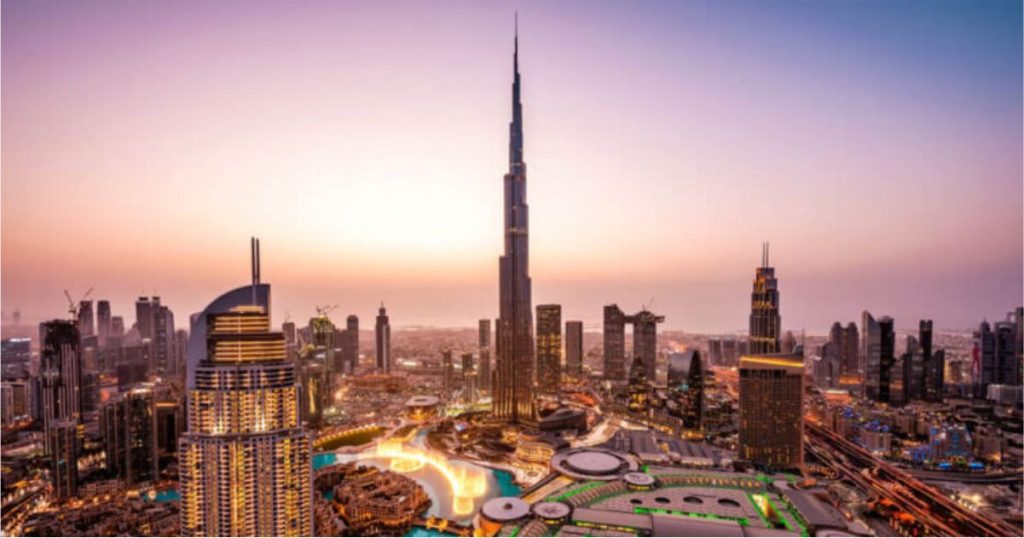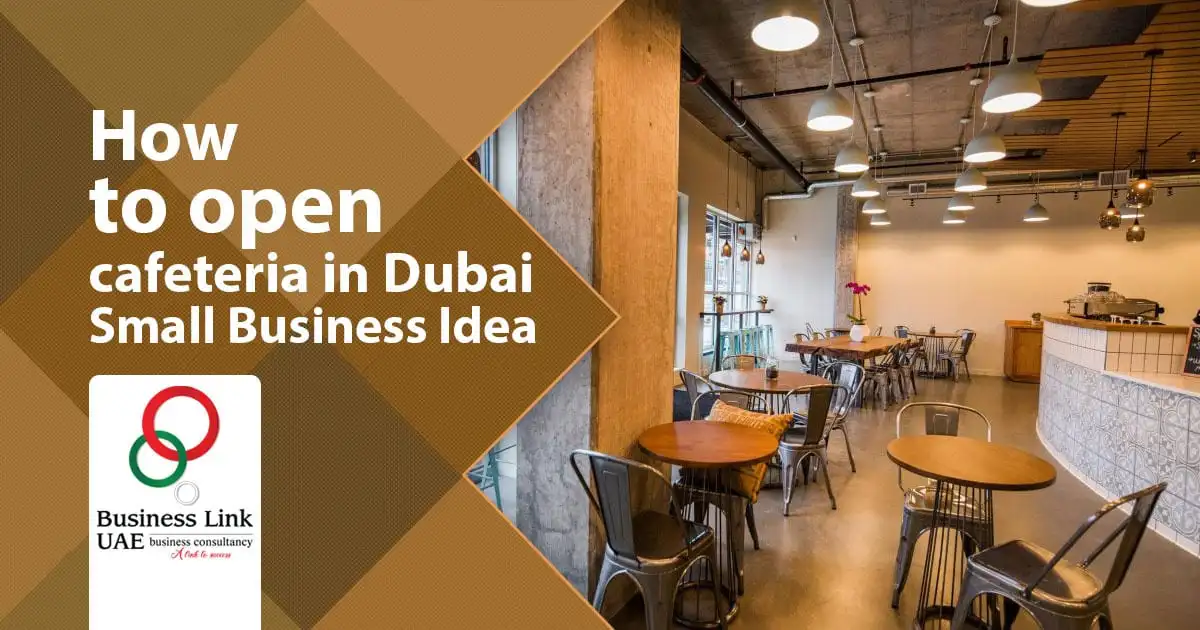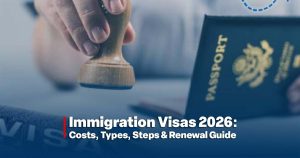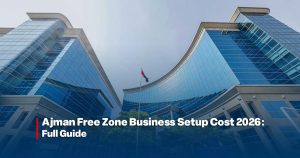Dubai cafeteria businesses are rising fast in 2025. But what makes them different from restaurants business? Lower setup costs, faster licensing, and steady demand give them an edge. Cafeterias serve workers, students, and tourists with quick meals every day. With smaller spaces and fewer staff, they are easier to run and expand. This guide explains licenses, documents, fees, and key steps so you can start a profitable cafeteria in Dubai with confidence.
Table of Contents
Toggle- What Is a Dubai Cafeteria, and How Is It Different From a Restaurant?
- Why Starting a Cafeteria in Dubai Makes Sense in 2025
- What license do I need to start a Dubai cafeteria?
- What Documents Are Needed for a Dubai Cafeteria License?
- How to Start a Dubai Cafeteria: The Complete 11-Step Guide
- Dubai Cafeteria License Fees in 2025 Explained
- What are the common reasons a Dubai cafeteria license is rejected?
- Summary
- FAQ’s
What Is a Dubai Cafeteria, and How Is It Different From a Restaurant?
A Dubai cafeteria is a small, low-cost food outlet offering fast meals, snacks, and drinks. It operates with limited staff and smaller kitchens and focuses on quick service. Unlike restaurants, it has no full table service or extensive menus. Cafeterias mainly attract workers, students, and travelers looking for quick, affordable food. Because of their simple setup, lower costs, and high demand, they’re a popular business model across Dubai’s busy neighborhoods and commercial areas.
Why Starting a Cafeteria in Dubai Makes Sense in 2025
Starting a Dubai cafeteria gives small investors a clear path to small business idea with fewer costs and simpler steps. Cafeterias serve students, workers, and tourists who eat out every day. With low risk and high demand, it’s one of the most stable business models in the UAE’s fast-moving food scene.
Here’s why many choose it over full-service restaurants:
16 Benefits of Starting a Dubai Cafeteria
- Needs less startup capital than restaurants
- Setup is fast with fewer approval steps
- A small space is enough to begin
- Lower staff requirements reduce payroll costs
- Runs well in markets, near offices, or in malls
- Customers include workers, tourists, and families
- Open all day, allowing more sales time
- The menu can start small and expand over time
- Local rules for licenses are easier to follow
- Delivery options like Talabat and Zomato work well
- No need for complex equipment or big kitchens
- Ideal for quick snacks, juices, and low-cost meals
- You can test new items with minimal loss
- High repeat customer rate in working areas
- Demand is stable year-round
- Fits the UAE’s fast lifestyle and dining habits
Cafeteria vs. Restaurant: Cost and Setup Comparison
| Feature | Cafeteria | Restaurant |
| Setup Cost | AED 200,000–300,000 | AED 400,000+ |
| Space Required | Small | Large |
| Staff Needed | 5–10 | 15–30 |
| Licensing Time | 2–4 weeks | 1–3 months |
| Target Customers | Workers, students, tourists | Families, formal diners |
| Menu Style | Budget meals, snacks, juices | Full meals, broad cuisines |
| Profit Margin | 20–30% | 15–20% |
Starting a Dubai cafeteria is low-cost business setup, simple, and meets daily demand. It’s one of the best entry points into the food market. With help from Business Link UAE, you can get the right license, prepare your setup, and start strong.
The sooner you begin, the faster you earn.
What license do I need to start a Dubai cafeteria?
To open a Dubai cafeteria, you need a Restaurant and Coffee Shop License issued by the Dubai Department of Economic Development (DED). You must also get approval from the Dubai Municipality Food Safety Department. Both steps are required before you can serve any food to the public.

What Documents Are Needed for a Dubai Cafeteria License?
Before you start a Dubai cafeteria, the right paperwork is a must. Missing a single document can delay your license. Here’s a simplified, complete list of what you need to prepare.
Required Documents for Dubai Cafeteria License
- Passport copies of all owners: Keep a valid, clear copy of each partner’s passport.
- Visa page and entry stamp: If you’re in the UAE, include your visa and latest entry stamp.
- Emirates ID copy: If available, add a copy of your emirates id for faster processing.
- Trade name reservation certificate: You must reserve your business name with the DED.
- Initial approval certificate: Get this from the Dubai Economic Department before moving forward.
- Tenancy contract (Ejari): Ensure the rental contract is registered under Ejari. It must be valid.
- Location sketch and floor plan: Attach a simple drawing of the cafeteria layout with dimensions.
- Food Safety Department approval: Secure this from Dubai Municipality for hygiene compliance.
- NOC from property owner (if needed): If your premises are leased, get a no-objection letter from the landlord.
- Civil defense approval: Required for fire safety compliance before you start operations.
- Kitchen layout plan: Floor plan showing storage, washing, and cooking areas.
- Memorandum of Association (MOA): MOA needed for cafeterias under LLC structure.
- Staff medical fitness certificates: Ensure food-handling employees are medically fit.
Start gathering your documents early. Even one missing paper can delay your Dubai cafeteria launch by weeks.
To Avoid Delays
- Double-check all documents before submission.
- Make sure tenancy is valid for at least 12 months.
- Kitchen layout must meet food safety layout guidelines.
- Get professional help if your documents are from outside the UAE (attestation may be required).
Want help with licensing?
Need help setting it up? Talk to a team of businesslinkuae that knows the system step by step. Working with a business setup consultant can save you weeks of delay. They handle every paper, every step, so you can focus on running your cafeteria.
How to Start a Dubai Cafeteria: The Complete 11-Step Guide
Opening a cafeteria in Dubai is a great chance. The process is straightforward if you know the exact steps. This simple, step-by-step checklist, compiled from official Dubai government authority guidelines, will guide you from your first idea to your grand opening.
Here’s your complete action plan:
1. Choose & Approve Your Trade Name
Pick a unique name for your cafeteria. It must follow Dubai’s naming rules, meaning it can’t be offensive, use religious terms, or copy an existing business.
2. Decide on Your Business Structure
The majority of cafeteria operators choose a Limited Liability Company (LLC).. A key decision is location:
- Mainland LLC: Allows you to trade anywhere in Dubai and supply other businesses directly. Recent laws allow 100% foreign ownership for many activities.
- Free Zone Company: Offers 100% ownership but limits your direct sales to the Dubai mainland market; you’d need a local distributor to supply cafes or shops outside the zone.
3. Get Initial Approval
Submit your application and chosen name to the Department of Economic Development (DED) for mainland companies, or to your chosen Free Zone Authority. This is your first official green light to proceed.
4. Find the Perfect Location
- Your spot is everything! Look for areas with high foot traffic, near offices, schools, or residential towers.
- Once you find it, you must sign a lease and register it with the Ejari system. This tenancy contract is mandatory for your license.
5. Design Your Kitchen for Approval
- Before you buy a single appliance, you must get your kitchen layout approved by the Dubai Municipality Food Safety Department.
- Their inspectors need to see plans for separate washing, cooking, and storage areas to ensure top hygiene.
6. Apply for Your Trade License
Submit all your documents—initial approval, Ejari contract, and kitchen plans—to the DED or your Free Zone to get your official Cafeteria Trade License. This gives you the legal right to operate.
7. Obtain Food Safety Clearance
- Municipality inspectors will check hygiene standards, kitchen setup, and storage methods.
8. Pass Final Inspections
Authorities will visit your location to give final clearance:
- The Dubai Municipality verifies that the approved drawings correspond with your actual kitchen.
- Dubai Civil Defense ensures your premises meet all fire and safety regulations.
9. Hire Your Team
Recruit skilled staff like chefs and servers. You must apply for their work permits and visas through the Ministry of Human Resources and Emiratisation (MoHRE).
10. Open a Business Bank Account
Use your new trade license to open a corporate bank account. This keeps your business finances separate and is essential for professional operations.
11. Start Operations & Market Your Business
You’re open! Now, attract customers. List your cafeteria on Google Maps and partner with food delivery apps like Talabat and Zomato to reach a wide audience immediately.
Key Approvals and Authorities for Starting a Dubai Cafeteria
| Step | Authority / Department | Mandatory? |
| Trade Name Approval | DED or Free Zone Authority | Yes |
| Initial Approval | DED or Free Zone Authority | Yes |
| Tenancy Contract (Ejari) | RERA (Real Estate Authority) | Yes |
| Kitchen Layout Approval | Dubai Municipality | Yes |
| Trade License Issuance | DED or Free Zone Authority | Yes |
| Final Food Safety Clearance | Dubai Municipality | Yes |
| Civil Defense Approval | Dubai Civil Defense | Yes |
| Staff Visa Processing | MoHRE (Labour Authority) | If hiring staff |
Typical Costs: Budget between AED 15,000 to AED 30,000+ for the entire setup process, including licenses and approvals.
Dubai Cafeteria License Fees in 2025 Explained
Starting a Dubai cafeteria is an exciting venture, but planning your budget is key. Costs aren’t just one fee; they are a sum of several government approvals and licenses. The total cost depends on your location, shop size, and the number of staff visas you need.
Based on official fee structures, here’s a clear and simple breakdown for 2025.
Dubai Cafeteria License Cost Breakdown
| Fee Type | Estimated Cost (AED) | Details |
| Trade Name Reservation | AED 620–720 | Depends on the name type you choose. |
| Initial Approval Fee | AED 120–150 | Required from the Dubai Economy for all new businesses. |
| Commercial License (Mainland) | AED 10,000 – AED 13,000 | This is the core yearly license fee. |
| Municipality Food Control Approval | AED 1,000–1,500 | Cost depends on your kitchen setup and size. |
| Ejari Registration | AED 3,000–6,000+ | Most cafeterias will pay this range, depending on shop size and location. AED 2,000 is only for very small or shared spaces under 200 sq ft. |
| Civil Defense Approval | AED 500–1,000 | Needed for fire and safety compliance. |
| Signboard Permit Fee | AED 350–1,000 | Considering the size and design of your signage. |
| Work Permit & Visa (Owner/Staff) | AED 3,500–5,000 | AED 3,500–5,000 per person
Covers application, medical, Emirates ID, and stamping. |
| Health & Safety Training | AED 200–500 | Mandatory training per employee for food handling. |
Estimated Total Setup Cost for Mainland Cafeteria
( Licensing & Legal Only)
| Cost Component | Estimated Range (AED) |
| Licenses & Permits | 17,000 – 20,000 |
| Kitchen & Hygiene Approvals | 2,000 – 3,500 |
| Rent & Ejari | 3,000–6,000 |
| Staff Visa & Work Permits | 3,500–10,000+
Total depends on the number of employees and visa packages. |
| Signboard, Training, Other Fees | 1,000 – 2,000 |
| Total Estimate | 25,000 – 35,000+ |
For the most accurate and personalized quote, it is highly recommended to consult directly with the Dubai Department of Economic Development (DED) or a licensed business setup consultant.
Setup and Operational Costs (Real Business setup)
- Kitchen equipment and appliances can cost between AED 100,000 and AED 150,000.
- Interior fit-out and furnishings range from AED 50,000 to AED 100,000, depending on your design choices.
- Staff hiring, salaries, and visas can cost around AED 20,000 to AED 40,000.
- Initial inventory and supplies will add AED 10,000 to AED 20,000.
- Marketing and branding, including online presence and promotions, may cost between AED 5,000 and AED 15,000.
Total Estimated Cost
Adding all these together, expect to invest between AED 210,000 and AED 360,000 to open a small to medium-sized cafeteria in Dubai. This span allows for differences in location, business scale, and personal preferences.
To Reduce Your Setup Costs
- Compare Free Zones vs. Mainland: Always wondering freezone or mainland, free zones can sometimes offer lower license rates and 100% ownership, but they may restrict where you can sell your food.
- Choose a Smaller Shop: A smaller space will reduce your rent and your Ejari registration fee.
- Submit Documents On Time: Avoid costly penalties and delays by ensuring all your application papers are complete and correct.
- Plan Your Staff Needs: Start with a smaller team to lower initial visa costs. You can always hire more people later as your business grows.
A Dubai cafeteria license setup typically costs between AED 25,000 and AED 35,000+.
This includes licensing, permits, approvals, and legal paperwork—but not kitchen setup, rent, staff, or operations.
Why Knowing Costs Matters
When you understand the full range of costs, you avoid surprises that can stall your project or consume your savings. Proper budgeting also helps you set realistic business goals and secure the right financing.
Remember, this is just the cost to get your license. The total cost to start your business—including rent, kitchen equipment, furniture, and initial food stock—will be much higher, often exceeding AED 150,000.
Knowing these exact fees helps you avoid surprise expenses. If you’re unsure about any requirements, working with a trusted consultant can save you time and prevent errors.
What are the common reasons a Dubai cafeteria license is rejected?
Common reasons include:
- Incomplete documents
- Inaccurate kitchen layout
- Food safety violations
- Rental issues
- Name conflicts in the DED system
A mistake in any step can cost you time and money. Business Link reviews your setup and makes sure you pass on the first try.
Summary
Starting a Dubai cafeteria is one of the smartest business choices in 2025. This article gives you a clear roadmap. From approvals to documents, every step matters for success. Business Link for business setup in dubai can handle your setup, registration, and license. Call today, get expert guidance, and turn your cafeteria idea into a steady daily income in Dubai’s growing food market.
Call our team today via phone at +97143215227, WhatsApp at +971502052735, or email at connect@businesslinkuae.com and get clear answers, expert advice, and hands-on help so you can attend your appointment fully prepared and confident.
FAQ’s
Can foreigners own a Dubai cafeteria outright?
Yes, but only in free zones. Mainland businesses require a UAE national as a sponsor (owning 51% of shares). Free zones permit 100% foreign ownership but limit operations to within the designated zone. Some free zones, such as DMCC or Dubai Silicon Oasis, offer cafeteria licenses.
How long does it take to open a Dubai cafeteria?
Typically 4–8 weeks. This includes:
- Trade name registration (1–2 days).
- Initial DED approval (3–5 days).
- Municipality inspections (2–3 weeks).
- License issuance (1–2 weeks).
Delays can occur if documents are incomplete or locations don’t meet standards.
What are common mistakes to avoid with a Dubai cafeteria?
- Choosing the wrong location (e.g., low foot traffic).
- Not verifying zoning laws with DED.
- Underbudgeting for hidden costs (e.g., waste management).
- Ignoring food safety protocols.
- Hiring staff without proper visas.
Partnering with a local consultant helps avoid these pitfalls.
How can I make my Dubai cafeteria profitable?
- Focus on quality: Sourcing fresh ingredients and unique menus.
- Control costs: Track inventory and avoid waste.
- Target office crowds: Offer lunch deals and delivery.
- Use social media: Promote daily specials and loyalty programs.
- Maintain high ratings: Good reviews attract more customers.
What staffing requirements apply to a Dubai cafeteria?
You need:
- Certified food handlers (with Dubai Municipality training).
- Licensed kitchen staff (visas sponsored by your company).
- A dedicated manager (to handle compliance).
All employees must pass health checks and hold valid Emirates IDs.
Can I start a Dubai cafeteria in a Free Zone?
Most Free Zones in Dubai don’t allow cafeterias that serve the public unless inside the zone itself. If you plan to open to the public, it’s better to choose mainland registration through DED. Mainland setup gives you more freedom to operate in the city and deliver across Dubai.




